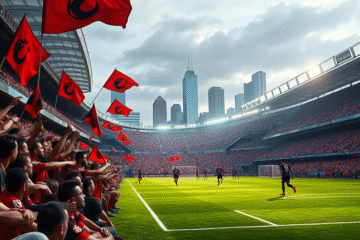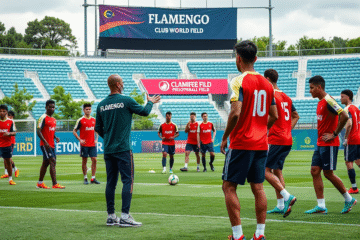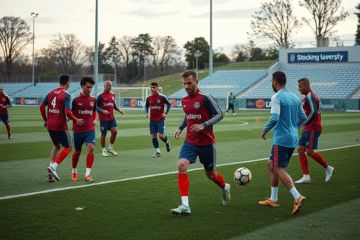Football Clubs React to Harmful Amendment Bill
Advertising Bets It is a topic that has generated great concern among football clubs in Brazil, especially with the introduction of Senator Carlos Portinho's Substitute.
In this article, we will explore the significant financial impacts this proposal could have on Brazilian sports, focusing on the consequences for smaller clubs that carry out essential social work.
We will also address the obstacles to brand exposure in sports venues, the legal risks associated with contract renegotiation, and support for Senator Romário's amendment, which seeks to provide legal certainty and a more balanced environment for competition and consumers.
Presentation of the Substitute Bill of May 21, 2025 and initial reaction of the clubs
O Substitute bill presented by Senator Carlos Portinho in May 21, 2025 proposes imposing strict limits on advertising by betting operators on sporting events.
Justified under the argument of social responsibility and combating addictions related to online gambling, the text appears in a political context of popular and parliamentary pressure for greater control of the market after years of effective regulatory absence between 2018 and 2024. However, the proposal generated serious concern among Brazilian football clubs, who quickly spoke out against its potentially disastrous effects.
Clubs claim that the text creates a disguised prohibition to static advertising inside sports arenas, directly impacting contracts already formalized.
It is estimated that the measure could cause losses of up to R$ 1.6 billion annually for the sector.
In response, the clubs supported Senator Romário's amendment, introduced on May 23, 2025, which seeks to preserve existing contracts and guarantee legal certainty to those involved.
- Immediate loss of advertising revenue
- Breach of existing contracts with betting operators
- Risk of legal collapse in commercial relations
- Serious impact on smaller clubs and their social projects
- Unfair restriction on competition between operators
- Direct harm to consumer freedom of choice
The clubs' reaction marks the beginning of a dispute that could reconfigure the economic structure of national football, leading to the next topic, which will address the profound impacts on the finances and operations of sports entities.
Financial and Social Impact on Smaller Clubs
The limitation on advertising by betting operators imposed by Senator Carlos Portinho's substitute bill directly threatens the sustainability of a large number of Brazilian football clubs, especially those with lesser standing.
These clubs, lacking large television ratings and million-dollar sponsorships, depend on advertising revenue to maintain their operations and fulfill important social functions in the communities where they operate.
It is estimated that the financial impact of this measure will exceed R$ 1.6 billion per year, compromising salaries, logistics and investments in youth categories.
While big clubs already have robust contracts and multiple sources of income, smaller clubs face a disproportionate impact.
Many maintain essential social projects that involve education, sports training and combating the social vulnerability of children and adolescents.
Practical examples include initiatives such as free weekend soccer schools, psychological and nutritional support for underprivileged youth, and partnerships with local schools for extracurricular activities.
By preventing the static exposure of partner brands, as provided for in the current project, these actions become imminently at risk.
Without this source of revenue, clubs will have to cut their budgets, which means immediate cut of community programs and possibly mass layoffs of administrative, technical and health professional staff hired locally.
This drastic change will result in a collapse not only in sport, but also in society, directly affecting the most vulnerable communities that find in these clubs an alternative for inclusion and development.
The proposal, by failing to recognize these particularities, ignores the fact that current contracts will need to be renegotiated or terminated, generating legal uncertainty and even greater economic damage.
Even more serious, a scenario is created of competitive imbalance, privileging certain operators while preventing clubs from freely choosing sponsors
Without adjustments to the legislative text, the survival of dozens of grassroots clubs and clubs from remote regions will be compromised, directly affecting the social fabric and sports development in the country.
To preserve the social relevance of smaller clubs and its contribution to Brazilian football, it is essential that the National Congress responsibly evaluate the practical effects of this apparently restrictive regulation
Restriction on Trademark Display and Legal Consequences
The recent proposal of the Substitute of Senator Carlos Portinho imposed significant restrictions on the exposure of betting operators' brands on static properties, such as advertising boards in stadiums.
Although it does not constitute an explicit prohibition, the text presents a disguised prohibition, placing clubs in a vulnerable position regarding their previously established advertising commitments.
This generates contractual insecurity and requires complex renegotiations that directly impact the economic and financial balance of contracts
In many cases, the only alternative found is early termination, subjecting clubs to sanctions, fines and even civil litigation in the judicial spheres
In addition to the direct loss of sponsorships, an annual financial loss of approximately R$1.6 billion is estimated, particularly affecting smaller clubs that maintain social projects rooted in their communities.
The following are examples of affected contracts:
| Contract Type | Expected Impact | Consequence |
|---|---|---|
| Static advertising of operators at the edges of the field | Violation of visibility clauses | Early termination or action for damages |
| Naming rights contract with betting operator | Impossibility of full contractual delivery | Contractual insecurity and loss of revenue |
| Advertising packages linked to sporting events | Risk of financial imbalance | Urgent renegotiation under risk of sanctions |
Faced with this, the amendment proposed by Senator Romário aims to mitigate damages by authorizing advertising linked to pre-existing agreements, promoting stability and respect for the negotiations signed
Support for Senator Romário's Amendment and Competition Debate
The amendment presented by Senator Romário in May 23, 2025 emerged as a direct response to the concerns of football clubs regarding the substitute under debate in the Sports Committee.
This legislative proposal severely restricted advertising by sports betting operators, compromising valid contracts signed before the bill was passed.
Romário's amendment seeks to ensure the legal certainty of these pre-existing contracts, allowing already licensed brands to continue to be displayed in accordance with current agreements, which preserves the financial stability of the clubs.
“Maintaining these contracts is vital for the sustainability of social and sports training projects carried out by smaller clubs across the country,” the clubs argued in a joint statement released to the public.
However, by maintaining the rule that allows the advertising presence of only one operator per event, the original substitute doubly harms the market balance.
This drastically limits the consumer freedom of choice while configuring a direct violation of competition principles, creating an environment favorable to monopoly, without guaranteeing efficient protection for bettors.
Diagnosis of Regulatory Failures (2018-2024) and Proposal for Improvement
- • Lack of effective supervision on the operation of betting platforms in the national territory
- • Lack of clear criteria for granting licenses and supervision of operators operating in Brazil
- • Lack of protection for gamblers and lack of educational campaigns about the risks of gambling
- • Disorganization in revenue collection and distribution from the betting sector
- • Legal uncertainty regarding sponsorship contracts between clubs and operators
Football clubs have adopted an active and responsible stance in the search for more effective regulatory solutions
In concrete terms, they defended the proposal of Senator Romario to ensure legal security for existing contracts and avoid abrupt interruptions in sponsorship, especially in smaller clubs that are financially dependent on these revenues. In addition, they support a balanced regulation that allows fair competition between operators, preventing monopoly of exposure, as proposed by the project analyzed in the Senate Since 2024, associations have been sending technical letters with proposals to strengthen oversight, protect consumers, and include compliance criteria for operators, demonstrating their commitment to a more integrated and sustainable sports ecosystem.
In summary, the current proposal for regulating betting presents challenges that could jeopardize the financial health of football clubs and, consequently, the development of the sport in Brazil. It is essential to seek solutions that balance regulation with the protection of the rights of consumers and bettors.




0 Comments